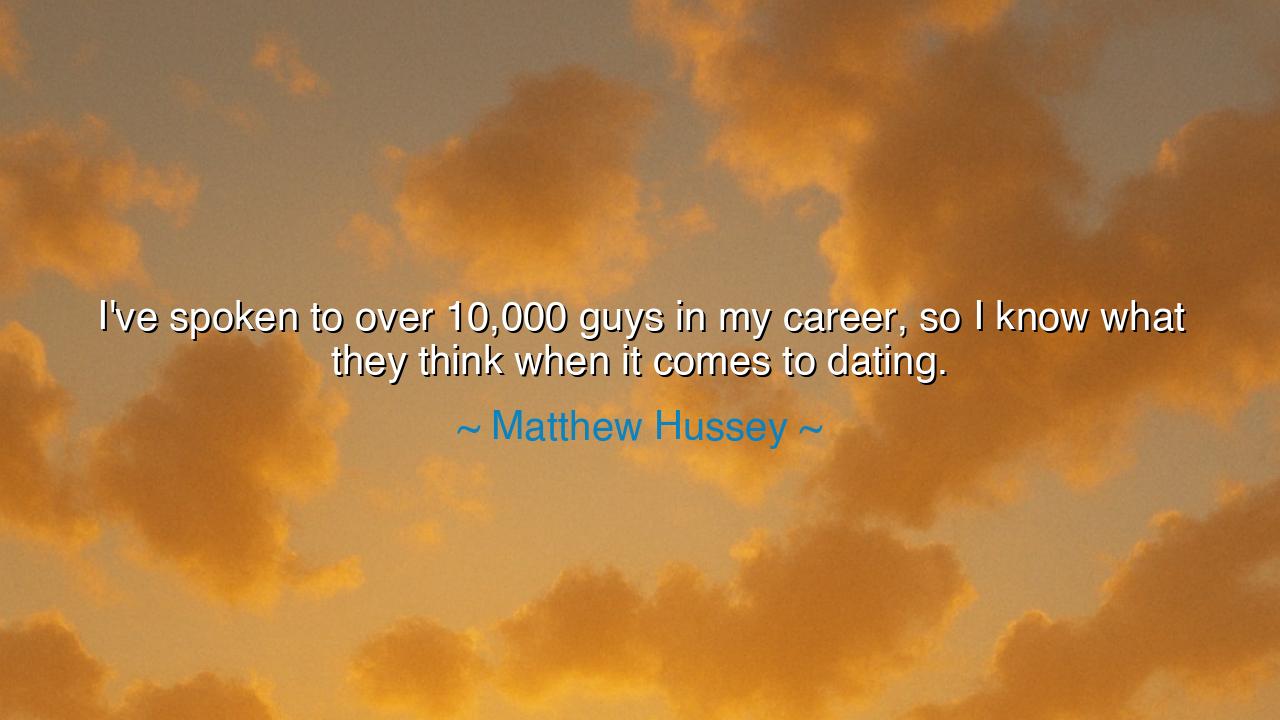
I've spoken to over 10,000 guys in my career, so I know what they
I've spoken to over 10,000 guys in my career, so I know what they think when it comes to dating.






In the crowded agora of modern love, a herald’s voice rises above the din: “I’ve spoken to over 10,000 guys in my career, so I know what they think when it comes to dating.” Thus speaks Matthew Hussey, and his claim is less boast than ledger—an account written in long afternoons of listening, in midnight workshops, in the soft thunder of countless first names. The sentence lays a foundation of witness: understanding built not from hunch or hearsay, but from the sheer weight of repeated human confession. When an ear has taken in ten thousand tides, it begins to read the moon.
Hear the structure of the saying. First, the verb of encounter—spoken—because knowledge of the heart requires nearness. Second, the magnitude—over 10,000 guys—a number that signals breadth beyond the anecdotal. Third, the stewardship—career—suggesting a craft honed, not a passing curiosity. Finally, the fruit—“I know what they think… about dating”—not omniscience, but pattern-sense, the ability to discern the recurring chords beneath the improvisations of personality. The ancients would call this phronesis, practical wisdom distilled from lived, patient attention.
What does such listening uncover? That bravado often masks timidity; that silence after a message may be fear of inadequacy rather than indifference; that many men hold unspoken scripts—about rejection, about performance, about being “enough”—and these scripts steer the hand more than desire does. To say one knows what men think is to recognize these scripts repeating like motifs in a long composition. Seen this way, coaching is not sorcery; it is translation—turning the mumbled grammar of anxiety into terms two hearts can understand.
A story to hang this on: a woman—call her Dara—once came weary to a seminar, certain men were lazy, noncommittal, allergic to effort. The coach asked her to bring one man’s actual words, not her summary. They read his messages aloud: cautious humor, careful timing, a detour to a shared interest, then a clumsy pivot to ask for coffee. Through guided listening, Dara heard not apathy but fear—cued by a past humiliation he’d hinted at and she had missed. She texted with curiosity rather than accusation; the next week, they met. The point is not a fairy-tale ending; it is the revelation that hearing precisely—after thousands of similar cases have trained your ear—can alter the road by a single, saving degree.
History offers a grander mirror. Consider the letters of Abelard and Heloise, or the diaries of Samuel Pepys: across centuries, the private words of men tell of the same triad—longing, pride, and fear—shaped by their age’s customs. Or think of early social researchers who sat with hundreds upon hundreds of interviews; patterns emerged not because one tale was definitive, but because many tales, layered, revealed the human constants. To say “I’ve spoken to over 10,000 guys” puts Hussey in that lineage of collectors of heartspeak, extracting the general from the flood of the particular.
From this, a lesson for seekers of love: before you judge, translate; before you assume, ask; before you despair, pattern-match. The claim to know what men think is not permission to stereotype; it is an invitation to notice recurring moves—the hesitations at the threshold, the need for clear signals, the relief when boundaries are named kindly. Wisdom treats patterns as maps, not cages. Maps guide; they do not imprison.
Practical rites for the road: (1) Replace mind-reading with micro-questions—“What did you mean when you said…?”—and let answers revise your map. (2) Provide clarity early: state your pace, your boundaries, your hope for the next step; many withdraw not from dislike, but from uncertainty. (3) Calibrate bids for connection—short, specific, time-bound invitations beat vague warmth. (4) Track behavior over declaration; repeated actions are the truest transcript of thinking. (5) Learn to hear fear’s dialect—jokes that dodge, delays that test safety—and respond with steadiness or, when needed, with a clean “no.” (6) Keep your own counsel strong: sleep, friends, purpose; people think more bravely in the presence of another person whose life is already whole.
So let the sentence stand as both banner and reminder: breadth of listening can yield depth of guidance. If one has spoken with over 10,000 guys, it is not to claim mastery over mystery, but to serve as a lantern-bearer on familiar paths—those places where courage falters and misunderstanding takes root. Walk with such lanterns, and you will waste less time in the thicket, and spend more of it where love, at last, can see where it is going.






AAdministratorAdministrator
Welcome, honored guests. Please leave a comment, we will respond soon